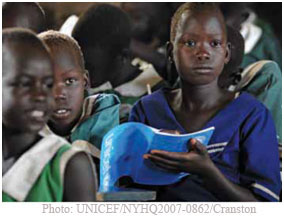UNOSAT supports the international humanitarian community since 2003, when it launched a Rapid Mapping Service, available 24/7 to UN and non-UN humanitarian entities responding to natural disasters and complex emergencies. The service provides maps and geospatial analysis on demand in the context of rapid response and it is funded by donor countries anxious to extend t the humanitarians the benefit of satellite technology.
Strengthening the service with a series of ad-hoc protocols with individual agencies has been a priority for UNOSAT over the past few years, to maximise the benefit of geospatial information by ascertaining the specific needs of each user and adapting the output to the specificity of each agency GIS capacity.
In the case of UNICEF, the parties agreed on a set of priorities including of course the provision of rapid mapping and analytical products in case of emergency, but also training and in field support. UNSOAT is always available to humanitarian operators to conduct in field work and has deployed its experts to crisis situations in both natural disasters and conflicts.

UNOSAT and the Office of Emergency Programmes of UNICEF, which signed the agreement, agreed also on the general need to develop further the use of satellite based mapping in humanitarian work carried out by UNICEF. According to the Manager of UNOSAT “there is a generalised tendency in relying more substantially on objective geospatial information when it comes to planning and executing humanitarian relief operations, even though there is still much to do to bring out the full potential of remote sensing for actual decision making at more senior level in the UN; but we are now seeing constant progress on this as well and we are working steadily to accompany this evolution with our applied research”.
UNOSAT rapid mapping for humanitarian response is available to all humanitarian entities at no direct cost, yet many agencies have complementary geo-information needs for which they rely on UNOSAT to save the funds, resources and time needed to develop specific satellite data processing capability. This type of framework agreement facilitates the request and provision of special tailored support both at headquarters and in the field. A growing number of humanitarian agencies are concluding this type of agreement with UNOSAT to ensure that they stay abreast of new development in the fast moving technology area of geo-information.
For more information on establishing a direct agreement with UNOSAT: unosat@unitar.org

